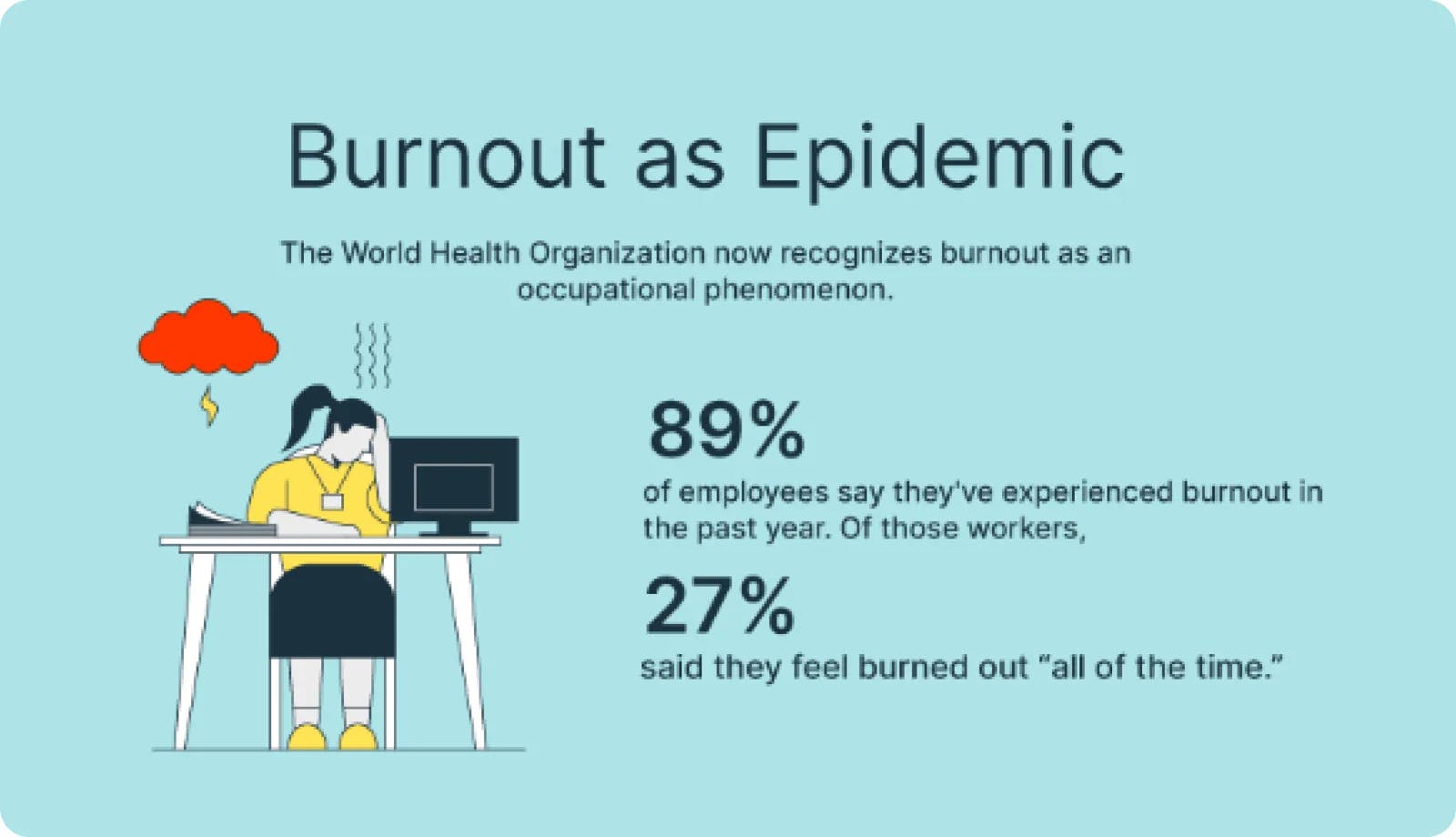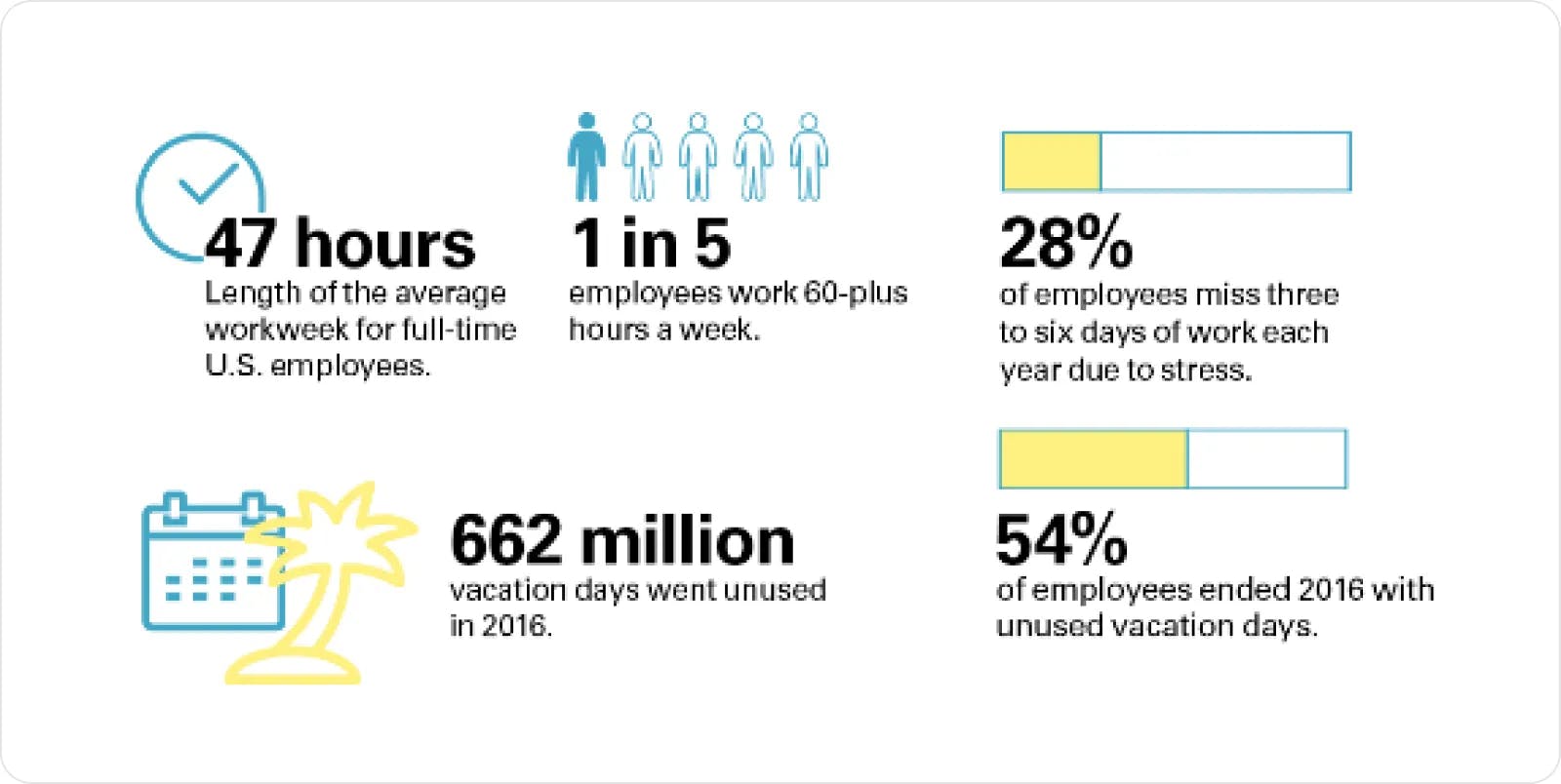Please note: This post contains affiliate links and we may receive a commission if you make a purchase using these links.
TABLE OF CONTENTS
When you're your own boss, it can be tough to draw the line between work and home life, and it's easy to feel like you're always "on,” which is why burnout from work can be a very real problem for entrepreneurs. It can be difficult to spot and even harder to know how to deal with it when you do.
In honor of World Mental Health Day on October 10, we’ve put together this list of proactive strategies and routines that you can start incorporating into your daily and weekly schedule now before burnout has a chance to take hold.
We're More than Just Business Formation.
Get One Platform to Manage Your Whole Business & All the Services You Need.
Click HereProactive Strategies
As an entrepreneur, you are expected to wear many hats and juggle a lot of responsibilities. Even though it's easy to get overwhelmed and burnt out with so much on your plate, there are ways to avoid this. First, it's important to set realistic goals and expectations for yourself. You can't do everything, and you shouldn't try to.
Productivity, time management and leadership coach, Alexis Haselberger, advises “prioritizing projects that get a high score for both impact and ease, or that are in the high impact/low difficulty quadrant.” Delegate tasks whenever possible, and don't be afraid to ask for help.
It's also important to take breaks and make time for yourself. It may seem like there's no time for hobbies or vacations when you're running a business, but it's important to recharge your batteries. Otherwise, you'll quickly find yourself feeling overwhelmed and burnt out.

Signs of Burnout for Small Business Owners
While the fast pace of running your own business can be exciting and exhilarating at first, it can also lead to stress and burnout if you're not careful. According to our recent study, 65 percent of entrepreneurs have suffered from anxiety, while over half have struggled with depression.
So how do you know if you're heading for a burnout? There are some common signs, including feelings of overwhelm, constant stress, difficulty sleeping and changes in appetite. However, there are also some lesser-known signs, such as increased irritability, isolation from friends and family and a loss of interest in hobbies.
Michael Levitt, Chief Burnout Officer of The Breakfast Leadership Network, also warns against increased mistakes, poor memory and decision-making struggles: "Entrepreneurial burnout occurs when people are in a state of emotional, physical and mental exhaustion caused by excessive and prolonged stress. It occurs when you feel overwhelmed, emotionally drained and unable to meet constant demands."
If you're beginning to notice any of these signs, it's important to take action to prevent a full-blown burnout. Some steps you can take include delegating tasks, setting boundaries and making time for self-care. By being aware of the signs of burnout and taking proactive steps to prevent it, you can ensure that you'll be able to continue running your small business for years to come.
What to Do When You Burnout
If you're an entrepreneur and have noticed signs of burnout, like feeling exhausted all the time, feeling drained or empty, having difficulty concentrating, feeling cranky or irritable and lacking motivation, it's time to take some steps to recover.
The first step is to acknowledge that you're burnt out. This can be a difficult thing to do, but it's essential in order to start the recovery process. Once you've acknowledged that you're burnt out, it's important to take some time for yourself. This might mean taking a break from work, spending time with friends and family or doing something that you enjoy outside of work.
Setting boundaries is key: Chris Tompkins, Associate Therapist at Theara, says that “boundaries around time are particularly helpful; this can look like finishing on time, taking regular breaks and using PTO. Availability boundaries are also advisable, such as responding to emails within a set time, turning off work phones at weekends or having a do not disturb signal for when you’re deeply engaged in a task.”
It's also important to find ways to reduce stress in your life. This might mean simplifying your schedule, delegating tasks or taking some time each day to relax and rejuvenate. By taking these steps, you can start on the road to recovery from burnout.

How to Recover from Burnout
1. Recognize the Signs
The first step to dealing with burnout is to recognize the signs. Burnout can manifest itself in a variety of ways, both physical and mental. Physical signs of burnout include fatigue, insomnia and headaches. Mental signs of burnout include irritability, anxiety and depression. If you are experiencing any of these symptoms, it is important to take action to prevent further damage to your health.
2. Identify the Cause
Once you have recognized the signs of burnout, it is important to identify the cause. There are a variety of factors that can contribute to burnout, including work-related stress, personal problems and financial difficulties. It is important to take a step back and assess all areas of your life in order to determine what is causing your burnout.
3. Seek Help
If you are struggling to deal with burnout on your own, it is important to seek help from a professional. A therapist can help you to identify the root cause of your burnout and develop a plan to address it. Additionally, your doctor can provide you with medication to help relieve some of the symptoms of burnout. Here are some resources to start with:
4. Make Changes
Once you have identified the cause of your burnout, it is important to make changes in your life in order to prevent it from happening again. If work is the cause of your burnout, consider making changes such as switching jobs or taking a break from work altogether. If personal problems are the cause of your burnout, consider seeking counseling or therapy. And if financial difficulties are the cause of your burnout, consider creating a budget or looking for ways to increase your income.
5. Take Time for Yourself
It is also important to make sure that you are taking time for yourself and doing things that make you happy. Dr. Meghan Downey, Clinical Psychologist at NY Health Hypnosis & Integrative Therapy, suggests hobbies, exercise, self-care, self-appreciation, rest and spending time with friends and family. These are key factors to maintaining a balance between your well-being and career. Our Bizee survey found that 61 percent of entrepreneurs practice some form of self-care. Taking time for yourself will help you to recharge and avoid future burnout.
Taking Care of Yourself and Your Business
Taking care of yourself — both mentally and physically — should be one of your top priorities as an entrepreneur. And if you do find yourself feeling burnt out, don’t hesitate to reach out for help. There are plenty of people who want to see you succeed, but first, you have to take care of yourself. What steps will you take today to ensure that your business and your mental health are thriving?
We're More than Just Business Formation.
Get One Platform to Manage Your Whole Business & All the Services You Need.
Click Here
Jenna Scatena
Jenna Scatena is a writer and content strategist with a love for stories that have never been told before. More than a decade of working with prominent magazines and brands informs her approach to impactful storytelling. Her stories have reached more than 30 million readers, won multiple awards and been anthologized in books. Jenna's work has appeared in Conde Nast Traveler, Vogue, Marie Claire, The San Francisco, BBC and The Atlantic. She's the founder of the editorial consultancy, Lede Studio.
like what you’re reading?
Get Fresh Monthly Tips to Start & Grow Your LLC









